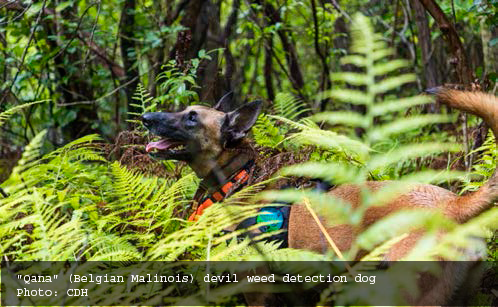Non-profit organization Conservation Dogs of Hawaii has been active in the local community sinceTheir mission is to protect Hawaii’s precious natural resources by utilizing trained scent detection dogs to sniff out a variety of wildlife targets, including both invasive and protected species. For example. by locating the burrows of endangered Hawaiian petrels, the dogs are able to contribute to the protection of those native seabirds by allowing conservation agencies and wildlife biologists to target specific areas for building predator-proof fencing.
On Oahu’s North Shore, CDH’s dog-and-handler teams are regularly up in the forests searching for invasive devil weed plants. Devil weed is considered one of the world’s worst 100 invasive species, and is a major concern in the islands because it is toxic to livestock and detrimental to agriculture. In addition, like many invasive plants, devil weed can impede the growth of native species by shading them out and releasing toxins into surrounding soil. It consumes large amounts of water, and therefore negatively affects soil nutrient levels. The plant’s name comes from its leaves, which have three veins that look like a pitch fork. When CDH first started their devil weed program, they weren’t sure how effective the dogs would be in finding the target plants. After almost three years of field work, they can say that the dogs are highly effective, with some detecting plants over 200 feet away through thick vegetation.
CDH recently started a new program on Maui to detect coqui frogs. University of Hawaii’s Maui Invasive Species Committee regularly conducts visual surveys and treatment of coqui frogs, but it can be challenging for humans to hear or see these frogs, especially when they’re inactive or at low density. That’s where the dogs’ acute sense of smell might help.
An exciting aspect of CDH’s invasive species programs is that the teams consist entirely of volunteer pet dogs and their owners. Citizen science meets canine scent work. There are several ways you can help CDH with necessary equipment and expenses:
1) shop for apparel at their online stores, 2) donate items in their wish list, or 3) give directly. The online store features their “Runnin’ with the Devil Weed” t-shirt, designed specifically to support their invasive plant program.
www.ConservationDogsHawaii.org ~ Instgram and Facebook: @conservationdogshawaii



